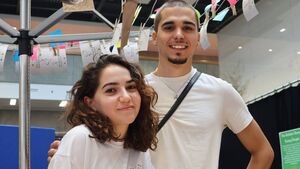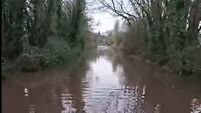Young people from across Europe join forces in reconnecting with nature at Waterford event

Anahit and Ikol, at SETU Arena for Pathways to Nature's Youth Participation Conference. Photo: Joe Evans
Young people from four European countries (Ireland, Spain, Finland and Armenia) came together at SETU Arena on Thursday, November 6, where they put on an immersive ‘Pathways to Nature’ experience for an audience of over 200 academics, local politicians, youth workers and other young people.
The Erasmus+ ‘Pathways to Nature’ Cooperation Partnership Project has been running for two years across Europe, and the aim of the project is to improve youth mental health and wellbeing through connecting young people with nature using youth work methodologies.
Building on the bedrock of youth work principles and practices, ‘Pathways to Nature’ uses the five pathways of senses, emotions, beauty, meaning and compassion to encourage and enable young people to connect with the outside world.
This connection, with the support of youth workers, leads to significant and measured improvements in areas, such as relationship development, resilience and determination, communication skills, planning and problem solving, confidence and agency, creativity and imagination, and emotional intelligence.
Participants then used their knowledge and skills to decide on, develop and run nature-based initiatives all across the continent, which included tree-planting, building nest boxes for birds of prey, bringing migrants together in the wilderness, and beautifying their own communities.
University College Cork’s Department of Applied Psychology examined the impact of the project on the mental health and wellbeing of the young people involved, and the important findings were presented in an evidence-based report that was released on the day.
Young people spoke about how connecting with nature has had transformative effects on their lives, and how the ripple effect of their actions has led to closer connections with their communities. The deceptively simple idea of ‘being out in the open’ has hugely beneficial impacts on young people’s lives.






